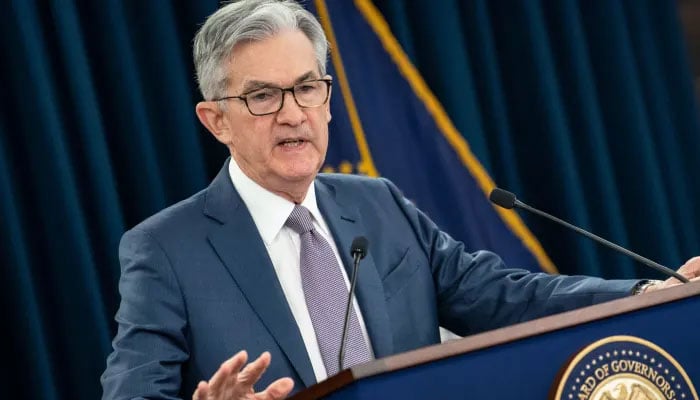Fed’s Powell hints interest rates will stay high as US inflation lingers
Frankfurt/Washington: Jay Powell said the Federal Reserve was looking at “keeping policy at the current rate for a longer time than had been thought” in the face of more persistent US inflation than expected.
Speaking at an event in Amsterdam in the Netherlands, the Fed chair said the US economy had been “performing very well lately” but the first months of 2024 had been notable for the “lack of progress” when it came to bringing inflation down to the central bank’s 2 percent target.
Powell said he expected inflation “will move back down on a monthly basis to levels that were more like the lower readings we were having last year” but “my confidence in that is not as high as it was”. He added the Fed needed to be “patient and let restrictive policy do its work”.
Still, Powell reiterated he did not expect the Fed to raise interest rates any further in light of stubborn inflation.“By many, many measures, the policy rate is restrictive,” Powell said, adding that “time will tell” whether it was “sufficiently restrictive” but there was only a “very small probability” that the next move would be to increase rates.
Krishna Guha, vice-chair of US investment bank Evercore-ISI, said Powell’s comments “suggest the Fed seems to be looking past the July meeting and is more oriented towards September for a possible first cut”.
US inflation has remained higher than forecast for much of this year, denting investors’ hopes that the Fed would cut rates multiple times before the end of 2024.
In contrast, price pressures in Europe have continued to ease, opening the door for central banks in the region to cut rates before the Fed in a reversal to the traditional pecking order in global monetary policy. The Swiss and Swedish central banks have cut rates and the European Central Bank is expected to do the same at its meeting on June 6.
Dutch central bank boss Klaas Knot, a member of the ECB’s rate-setting governing council, told the same event in Amsterdam that if Eurozone inflation kept falling as expected it would be “appropriate for us to gradually take our foot off the brake” by starting to cut rates next month.
But Knot said the recent “bumpiness” of US inflation was “a warning sign” for Europe that it could experience a similar rise in price pressures, adding that this was a reason “not to have any pre-emptive declarations of victory” on inflation.
He also warned that while wage rises seemed to be gradually slowing, Europe’s weak productivity growth would keep pushing up labour costs, which meant he would give “no commitment whatsoever” to any further easing beyond June.
Some ECB policymakers have warned there are limits to how much it can diverge from the Fed, which usually takes the lead on policy shifts. However, Knot said it would “not have that much impact” on Eurozone inflation if the ECB cut rates before the US central bank.
-
 Camila Mendes Reveals How She Prepared For Her Role In 'Idiotka'
Camila Mendes Reveals How She Prepared For Her Role In 'Idiotka' -
 China Confirms Visa-free Travel For UK, Canada Nationals
China Confirms Visa-free Travel For UK, Canada Nationals -
 Inside Sarah Ferguson, Andrew Windsor's Emotional Collapse After Epstein Fallout
Inside Sarah Ferguson, Andrew Windsor's Emotional Collapse After Epstein Fallout -
 Bad Bunny's Star Power Explodes Tourism Searches For His Hometown
Bad Bunny's Star Power Explodes Tourism Searches For His Hometown -
 Jennifer Aniston Gives Peek Into Love Life With Cryptic Snap Of Jim Curtis
Jennifer Aniston Gives Peek Into Love Life With Cryptic Snap Of Jim Curtis -
 Prince Harry Turns Diana Into Content: ‘It Would Have Appalled Her To Be Repackaged For Profit’
Prince Harry Turns Diana Into Content: ‘It Would Have Appalled Her To Be Repackaged For Profit’ -
 Prince William's Love For His Three Children Revealed During Family Crisis
Prince William's Love For His Three Children Revealed During Family Crisis -
 Murder Suspect Kills Himself After Woman Found Dead In Missouri
Murder Suspect Kills Himself After Woman Found Dead In Missouri -
 Sarah Ferguson's Plea To Jeffrey Epstein Exposed In New Files
Sarah Ferguson's Plea To Jeffrey Epstein Exposed In New Files -
 Prince William Prepares For War Against Prince Harry: Nothing Is Off The Table Not Legal Ways Or His Influence
Prince William Prepares For War Against Prince Harry: Nothing Is Off The Table Not Legal Ways Or His Influence -
 'How To Get Away With Murder' Star Karla Souza Is Still Friends With THIS Costar
'How To Get Away With Murder' Star Karla Souza Is Still Friends With THIS Costar -
 Pal Reveals Prince William’s ‘disorienting’ Turmoil Over Kate’s Cancer: ‘You Saw In His Eyes & The Way He Held Himself’
Pal Reveals Prince William’s ‘disorienting’ Turmoil Over Kate’s Cancer: ‘You Saw In His Eyes & The Way He Held Himself’ -
 Poll Reveals Majority Of Americans' Views On Bad Bunny
Poll Reveals Majority Of Americans' Views On Bad Bunny -
 Wiz Khalifa Thanks Aimee Aguilar For 'supporting Though Worst' After Dad's Death
Wiz Khalifa Thanks Aimee Aguilar For 'supporting Though Worst' After Dad's Death -
 Man Convicted After DNA Links Him To 20-year-old Rape Case
Man Convicted After DNA Links Him To 20-year-old Rape Case -
 Royal Expert Shares Update In Kate Middleton's Relationship With Princess Eugenie, Beatrice
Royal Expert Shares Update In Kate Middleton's Relationship With Princess Eugenie, Beatrice




